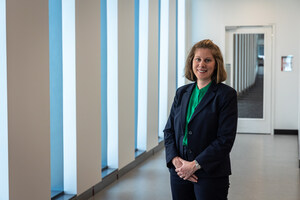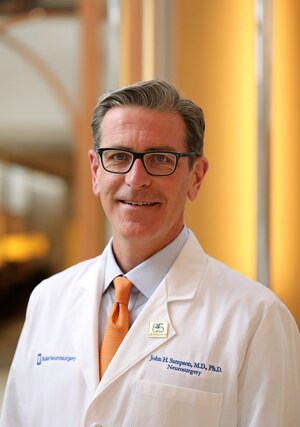ARPA-H award will allow researchers to make whole eye transplantation a reality with the goal of restoring vision to patients with total blindness
AURORA, Colo., Dec. 2, 2024 /PRNewswire/ -- The University of Colorado Anschutz Medical Campus will receive up to $46 million from the Advanced Research Projects Agency for Health (ARPA-H) Transplantation of Human Eye Allografts (THEA) program to advance pioneering research aimed at curing total blindness through human eye transplantation.
The award will support the work of the Total Human Eye-allotransplantation Innovation Advancement (THEIA) project team led by CU.
The project is led by principal investigator and surgeon-scientist Kia Washington, MD, and co-principal investigator Christene A. Huang, PhD, transplant immunologist. Both are professors at the University of Colorado School of Medicine and are nationally recognized leaders in plastic and reconstruction surgery, transplant surgery and immunology.
"Currently, there has never been a successful whole human eye transplant for the restoration of vision," said Washington. "We believe the great advancements over the last two decades in technology, transplantation surgery and regenerative medicine now make restoration of vision possible."
ARPA-H is a federal agency established to advance high-potential, high-impact biomedical and health research that cannot be readily accomplished through traditional research or commercial activity.
The CU Anschutz team will begin with animal models to forward optic nerve regenerative strategies, immunosuppression, and post-operative care, with the goal of advancing to human trial studies. Washington will lead the overall scientific team and the surgical team.
"One of the most complex parts of the procedure is the successful reattachment of the optic nerve. Think of it as fixing a broken electrical connection so that signals from the eye can be transmitted to the brain," Washington said. "Monitoring and aftercare are equally important to make sure the brain continues to receive the correct signals and is accepting the new eye."
Huang's team will study how the immune system reacts to the new eye.
"Our goal is to make it easier for the body to accept the new eye without rejecting it. To do that, we will create practical methods to manage inflammation and prevent transplant rejection," said Huang.
The team said the work could also be translated to other parts of the body.
"The techniques and advancements we develop could be used to treat blindness while offering new solutions for other neurodegenerative disorders that impact the central nervous system," Washington said. "For example, treating conditions like spinal cord injuries or brain damage. This could also be used in progressive brain disorders like Alzheimer's and Parkinson's disease."
This project will be in collaboration with several partners.
Johns Hopkins University will use a special type of molecule called a dendrimer to deliver genetic instructions to the retina and the optic nerve to help fix or modify how certain functions are working to improve vision. The team will also look for genes that regulate the nerves in the eye and use them to help them recover and regenerate more effectively.
The University of Wisconsin, Indiana University, and the National Eye Institute will work together to develop a bio-engineered "nerve bridge" to connect the donor's optic nerve with the recipient.
Researchers at the University of Southern California will work to create a system that uses electrical signals to support the successful addition of nerve cells into an existing part of the eye, improving function and helping with vision. Additionally, they will use gentle electrical currents to help cells adapt to their new environment.
Investigators at Cedars Sinai Medical Center will create protocol for the surgery to make sure donors of the eye are properly checked and approved before the procedure is performed.
The Foundation Fighting Blindness will manage reporting for this complex effort.
"Receiving this funding is a transformative milestone for CU Anschutz and our partners," said Laura Buccini, DrPH, MPH, assistant vice chancellor for research development and strategy at CU Anschutz. "It accelerates our mission to revolutionize vision restoration and underscores our collective commitment to pioneering advances in regenerative medicine. By leveraging the combined expertise of our collaborators, we are poised to make significant strides, bringing new hope to those affected by vision loss."
About the University of Colorado Anschutz Medical Campus
The University of Colorado Anschutz Medical Campus is a world-class medical destination at the forefront of transformative science, medicine, education and patient care. The campus encompasses the University of Colorado health professional schools, more than 60 centers and institutes and two nationally ranked independent hospitals - UCHealth University of Colorado Hospital and Children's Hospital Colorado – which see more than two adult and pediatric patient visits yearly. Innovative, interconnected and highly collaborative, the CU Anschutz Medical Campus delivers life-changing treatments, patient care and professional training and conducts world-renowned research fueled by $910 million in annual research funding, including $757 million in sponsored awards and $153 million in philanthropic gifts.
Media contact: Julia Milzer, [email protected]
Find the latest University of Colorado Anschutz Medical Campus news here.
SOURCE University of Colorado Anschutz Medical Campus

WANT YOUR COMPANY'S NEWS FEATURED ON PRNEWSWIRE.COM?
Newsrooms &
Influencers
Digital Media
Outlets
Journalists
Opted In







Share this article